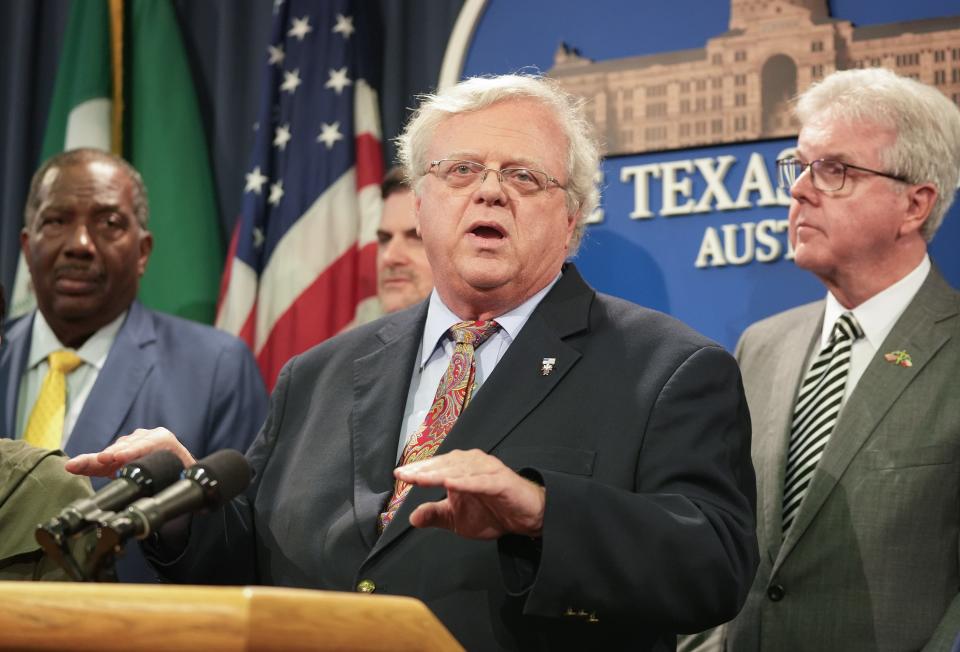If Texas voters agree on anything it's that their leaders are out of touch
- Oops!Something went wrong.Please try again later.
AUSTIN — For the good news, a new poll shows broad bipartisan agreement among Texas voters when it comes to the actions of the Legislature.
But the bad news is that a very healthy majority in both parties say that whatever lawmakers managed to accomplish during one 140-day regular session and the four 30-day special sessions that followed, it probably isn't going to improve their lives or make much of a difference across the state.
That's not exactly a vote of confidence, as all 150 seats of the Texas House and half of the 31 Senate seats are up for grabs in 2024 and will be decided by what appears to be a very grumpy and cynical electorate.
The poll of 1,200 registered voters was conducted by the Texas Politics Project, an arm of the University of Texas, and questioned respondents on a broad range of topics, including what they think of the Legislature, Gov. Greg Abbott and the presiding officers of both chambers.
Texans who tuned in, even casually, to the machinations inside the Capitol starting in January and finally wrapping up early this month probably know that cutting property taxes, spending billions more for border security, addressing a range of issues on the education front and the travails of Attorney General Ken Paxton got the bulk of the attention.
More: Why Operation Lone Star is both expensive and politically popular for Gov. Greg Abbott
Abbott, Lt. Gov. Dan Patrick, House Speaker Dade Phelan and lawmakers in both parties probably bragged most and loudest about what was billed as an $18 billion reduction in local property taxes. One of the measure's prime authors, Republican state Sen. Paul Bettencourt of Houston, could barely contain his enthusiasm for the package. His go-to superlatives were "whopping" and "eye-popping."
But the poll showed that fewer than three in 10 Texans have any confidence they'll see much, if any, of that $18 billion. Actions on topics like border security and public education drew similar scores. A skeptic might counter with something like "the Democrats are driving down the numbers because they don't like anything Republicans do."
We can take it as a given that the blue team doesn't trust the red team, and vice versa. But in this case, 35% of Republicans were in agreement with the 24% of Democrats and the 18% of independents who aren't buying the hype over property taxes. Put bluntly, the eyes of Texas remain decidedly unpopped by the ballyhooed tax cut.

Other skeptics might point out that the voters in November told the real story on the matter. It's absolutely true that 84.4% of the voters marked their ballots "yes" on the tax cut plan, known as Proposition 4. But let's take a closer look at what 84, or any percent, really means in an off-year election.
According to the Texas Secretary of State's Office, which is in charge of keeping track of such things, 17.76 million people in the state are registered to vote. But look at how many people actually went to the polls last month. We're talking 2.56 million. Of them, 2.1 million said yes on Prop 4.
More: Fighting with the House speaker, no matter which one, is old hat for Lt. Gov. Dan Patrick
Any fourth-grader with access to calculator app on a smart phone can tell you 2.1 million is a whole lot less than 84% of 17.76 million.
So about 15 million registered voters never made it to the polls. Generally, when people are asked why they don't vote, "because it doesn't make any difference" is not an uncommon response. That kind of tracks what most respondents told the pollsters about the work of the Legislature, be it tax cuts, border security or education.
On education, a lot was promised during all that time lawmakers spent in Austin this year, but not a lot was delivered. Which points to another key finding in the poll. Voters by lopsided majorities expressed support for a whole slew of K-12 proposals that were left sitting on the table.
Raising teachers' pay didn't happen, but eight in 10 said it should have. More money to schools based on how many kids are enrolled drew nearly 70% support. Spending more for school safety topped them all with the backing of 82% in the poll.

Another thing that didn't happen was the enactment of a school choice, or voucher program that would allow tax dollars to be used to offset private tuition. Even though it was the issue that drew the most attention with Abbott and Patrick shoving several stacks of their political chips to the center of the table, it had the least support among voters in the polls.
On this, you could make a legitimate argument that partisanship was the driving factor. Overall support for vouchers was 54%, but among Republicans, the margin was seven in 10. The 30% of Republicans who said they either opposed the plan, or said they didn't know or care about it, is significant. Enough GOP members in the Republican-dominated House aligned with the Democrats to derail the plan backed by Abbott and Patrick.
The main reason they gave was that they were voting in line with the wishes of the voters in their home districts. But that hasn't stopped Abbott and deep-pocket conservative interest groups from painting targets on many of the backs of the no-voucher Republicans heading into the March primaries.
That leaves the question, on this particular issue, will what the Legislature did or didn't do this year make any difference in the lives of Texas voters? We'll have to wait until next year to find out.
John C. Moritz covers Texas government and politics for the USA Today Network in Austin. Contact him at jmoritz@gannett.com and follow him on Twitter @JohnnieMo.
This article originally appeared on Corpus Christi Caller Times: Why there's bipartisan disenchantment with the actions of state leaders

